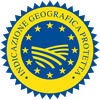Description
The Aachener Printen PGI are typical Christmas sweets. The following ingredients are used for their production: molasses, water, rum, potassium carbonate, a small stick of crystallized sugar, sugar, candied orange, and several spices amongst which cinnamon, cloves, anise, and coriander, as well as flour.
Production Area
The production area of the Aachener Printen PGI is located in the city of Aachen, in the federal state of North Rhine-Westphalia.
Production Method
The processing starts with the addition of syrup to water, which is heated and mixed. After cooling, the potassium carbonate is melted in the rum and the stick of crystallized sugar is crumbled. Everything is mixed and kneaded once more. Successively, the dough obtained is wrapped in plastic and left to rest in a cool place. It is then rolled out and cut into small rectangles. Then follows the baking, after which the pieces obtained are left to cool off. Finally, they are covered with icing, chocolate or almonds.
Appearance and Flavour
The Aachener Printen PGI can be produced in various shapes and are characterised by a sweet and delicately spicy flavour.
History
The Aachener Printen PGI boasts old origins. The first sweets of this kind probably originated from the Belgian city of Dinant, which has been producing sweets with engraved figures for over a thousand years. The traditional recipe of this sweet was brought to Aachen in the 15th century by the immigrant copper artisans. Originally, the sweets were produced with honey. When Napoleon imposed an embargo to the importation of products from the USA, a big honey exporter, it was substituted by syrup obtained from sugar beet.
Gastronomy
The Aachener Printen PGI are preserved in cans at room temperature. They are consumed just like normal biscuits, but an excellent way of fully enjoying their fragrance is to have them with a glass of Glühwein, a very good warm wine, very similar to mulled wine.
Marketing
The product is sold as Aachener Printen PGI, in its soft or hard version, covered with icing, chocolate or almonds. It is marketed mainly in giftwrappings of different sizes, weights and materials. The availability includes: wooden boxes with five varieties of biscuits, holding 400 gr; wooden boxes with the soft Aachener Printen PGI holding 600 gr; boxes with an assortment of both soft and hard biscuits holding 800 gr or 1200 gr; cans with a varied assortment holding 1120 gr, 800 gr, and 400 gr; and finally, the traditional cardboard boxes, with a varied assortment holding 400 gr, 870 gr and 1600 gr.
Distinctive Features
The Aachener Printen PGI were sold by pharmacists, since some of the ingredients, such as honey, herbs and spices, were considered curative.






